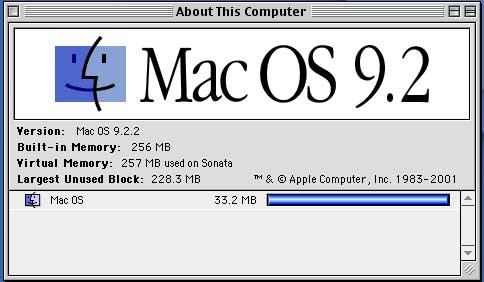READ THIS ENTIRE POST If you have Mac OS X Installed and want to Install Mac OS 9 from within OS XIn the download folder (linked below), you will find a disk image ("dmg") file called OS9General.dmg that you can download to your OS X partition. You can then use the Mac OS X program "Disk Utility" to restore it to a new, empty disk partition. Lastly, using "Startup Disk" is System Preferences, you can set the newly created Mac OS 9 partition/drive as your start up disk. Please read the instructions below the link, since there are other Mac OS 9 versions in our downloads that have updated video and system files; this post has been left as a general understanding and background information for the DMG version that is commonly found all over the WebDownload Password: macos9livesCLICK HERE TO DOWNLOAD CRITICAL - INSTALL MAC OS 9 DRIVERS FIRST !
CRITICAL - INSTALL MAC OS 9 DRIVERS FIRST !
It is important that the disk drive containing the partition you are installing Mac OS 9 onto has been formatted with the option for "Mac OS 9 Drivers" checked... otherwise, ANYTHING ON THAT DISK WONT BE VIEWABLE TO OS9. This is the biggest cause for problems when trying to install Mac OS 9 from OS X; The Mac OS 9 drivers are basically a few bytes of info. at the beginning of the drive that are read by Mac OS 9 (and ignored by Mac OS X). The only way to install these drivers is when you initially partition a drive from scratch... this can either be done in PowerPC versions of OS X using 'Disk Utility' or from a Mac OS 9 system using 'Drive Setup'
MORE INFO: http://support.apple.com/kb/TA20774 CONTINUED INSTRUCTIONS & OTHER INFO:
Once you have the file downloaded to your Mac OS X partition, you will be using the "Disk Utility" app under the Applications/Utilities folder to restore the .dmg file (disk image) to a new partition on a drive other then your OS X drive (you can use another partition on your OS X hard drive if it has more than one partition and if it has the Mac OS 9 drivers already installed on it from when it was originally formatted).
You can also use Disk Utility to create the partitions you want on a new hard drive and remember it's always handy to have a few extra partitions that can be used as bootable volumes for maintenance or trouble-shooting. Lastly, when formatting your drive do not select "journaling" as journaling is an OS X only feature that did not exist for Mac OS 9 and remember as previously stated, check the "Install Mac OS 9 drivers" option.
MORE INFO. ON JORNALING: http://en.wikipedia.org/wiki/HFS_Plus After the drive is formatted with Mac OS 9 Drivers, use the Disk Utility to select the image and then select the target partition and choose RESTORE. After the restore process is complete.. use the startup disk option under system preferences to choose the drive and Reboot into Mac OS 9.NOTE FOR CLASSIC ENVIRONMENT: If you just want to use the "Classic" environment support for running Classic Mac OS Apps from within 10.4 or 10.3, you could simply mounted the .dmg file and copy it's contents to your OS X Boot Partition, this should facilitate the "classic" subsystem of X's need for a system folder.We have another Mac OS 9.2.2 install (with all the latest updated drivers) you can download HERE...http://macos9lives.com/smforum/index.php/topic,1859.0.html (475mb approx)As a Final Note After the install you can run the System profiler to see what video card is in the newly setup mac and run the extensions manager to turn off the nVidia or ATI drivers that the current system doesn't need as well as any other un-needed extensions.
Also see this Post about Optimizing Extensionshttp://macos9lives.com/smforum/index.php?topic=570.0Different Versions Information: (thanks to Apfel)OS9general.dmg Image:
Mac OS ROM Version
9.6.1, Mac OS CPU Software
5.4 from 09.2002
Graphics Card Updates all from September 2002
"ATI 8500 3D Accelerator" Extension, Version 7.0.
6, Mac OS CPU Software 5.4
"ATI Driver Update" Extension, Version 2.
2.5, Mac OS CPU Software 5.4
"Nvidia 2D Accelerator" Extension, Version 3.5.2, Mac OS CPU Software 5.4
Mac OS 9.2.2 Universal (Just Format & Drag files) Image
Mac OS ROM Version
10.2.1, Mac OS CPU Software
5.9 from 04.2003
Graphics Card Updates from 10.2002
"ATI 8500 3D Accelerator" Extension, Version 7.0.
7, Mac OS CPU Software 5.9, from 10.2002
"ATI Driver Update" Extension, Version 2.
4.4, Mac OS CPU Software 5.9, from 03.2003
"Nvidia 2D Accelerator" Extension, Version 3.5.2, Mac OS CPU Software 5.4
 Author
Topic: How to Install Mac OS 9 if you already have OS X Installed (Read 126721 times)
Author
Topic: How to Install Mac OS 9 if you already have OS X Installed (Read 126721 times)
